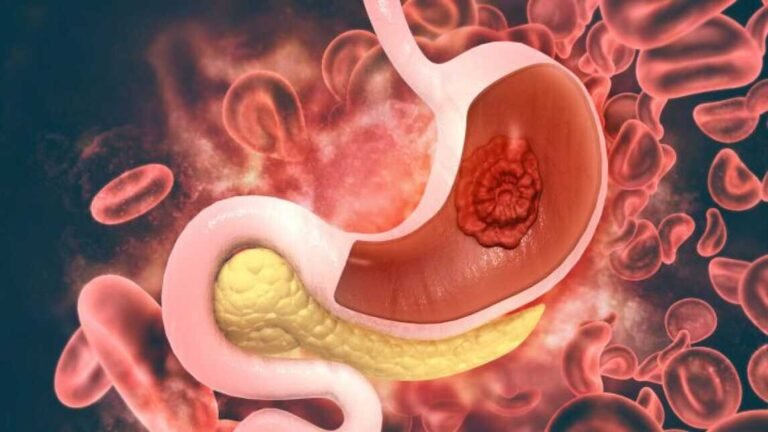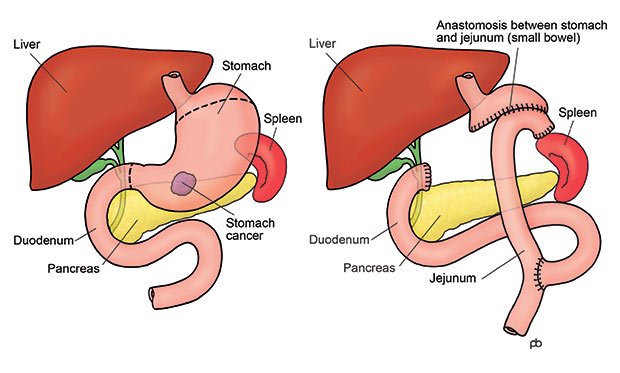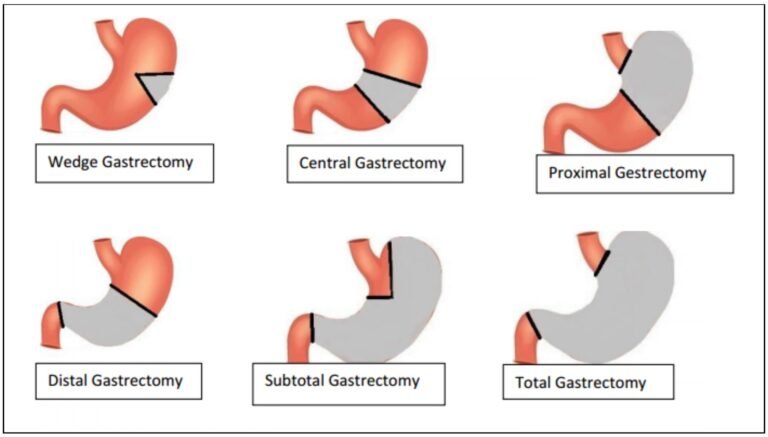Gastric Cancer surgery

Stomach cancer is a rather regular occurrence. It mainly affects adults and people of both genders. Cancerous affection of almost every organ is possible.
Cancer is characterised by the rapid spread and proliferation of cells from a specific organ or organ system. These cells, however, are not normal. Their form, size, and function are all altered.
The spread of such cells causes the organ or organ system in concerned to be damaged. Cancer can spread to neighbouring organs and invade other organ systems. All of this demands surgery for stomach cancer.
Surgery for Stomach Cancer
Surgical treatment involves removing the cancerous area of the stomach as well as surrounding lymph nodes and organs. It may also be done to relieve the patient’s cancer symptoms.


Why Surgery?
- The course of treatment for stomach cancer is determined by the stage of the tumour.
- Staging is a way of determining the extent and severity of cancer.
- Stomach cancer is divided into five stages, ranging from 0 to 4.
Stomach Surgery
The following are the reasons for stomach surgery
- Palliation: Cancer is accompanied with tumour development. In the case of stomach cancer, the tumour may develop and eventually begin to obstruct food passage farther into the digestive tract.
- Other therapeutic approaches are ineffective: Surgery is rarely used as the first line of therapy for any ailment. Radiation therapy and pharmaceutical therapy are often used first in the treatment of cancer. However, in rare circumstances, they may not function properly. This might happen if the cancer has spread. It can also arise as a result of radiation and pharmaceutical therapy contraindications. The oncologist may then decide on surgery.
- In addition to other therapies: In cancer instances, one way of treatment is frequently insufficient. Surgery may be combined with either radiation or chemotherapy in this scenario.
- Prevent further spread: Surgery is sometimes performed to remove lymph nodes around the stomach that may or may not be impacted by cancer. The removal of lymph nodes aids in the prevention of cancer spread. Cancer spreads most commonly through lymph nodes.
Depending on the stage of the illness, several types of operations are used to treat stomach cancer. There is a subtle distinction between surgery and other forms of therapy. Medical therapy or radiation therapy do not require as much advance preparation as surgery. If medical therapy is recommended, the doctor will thoroughly examine the situation, reach a decision, and prescribe the most appropriate medications. The doctor is not required to sit next to the patient as they take their medicine or to constantly check them as soon as they do. A frequent follow-up is typically sufficient.
The doctor will determine the dose and angle of the radiation beams and execute the surgery during radiation treatment. Except for soon following the surgery, he does not need to keep the patient under continual supervision. Surgery, on the other hand, is a very different storey. It is a more involved technique that must be carried out. The doctor must be present at all times when doing surgery. The doctor must prepare the patient for surgery ahead of time.
The sort of surgery to be conducted is decided by the stage of stomach cancer and the extent of the accompanying damage. Following surgery, the patient need particular care. It needs more planning than other types of therapy.lymph nodes around the stomach that may or may not be impacted by cancer. The removal of lymph nodes aids in the prevention of cancer spread. Cancer spreads most commonly through lymph nodes.
Pre-operative Preparation
Consent
- Before deciding on surgery as a treatment option for stomach cancer, the doctor will generally have a thorough conversation with the patient and their immediate family.
Only in instances when the procedure must be performed in an emergency will the discussion portion be avoided. - Prior to surgery, the patient and, in some cases, a family member must sign a permission document.
Investigations
- Following the decision to proceed with surgery, the patient must undergo a battery of medical testing.
- These tests will establish whether or not the patient is fit for surgery.
- A blood test is performed to assess haemoglobin levels, blood type, and blood sugar levels.
- Patients with unusually high blood sugar levels require treatment.
- Only once blood sugar levels have returned to normal may surgery be conducted.
- Blood grouping is required to maintain some fresh blood on hand for transfusion in the event of significant blood loss during surgery.
- An ECG is used to evaluate heart function.
- Lung function tests will be performed to evaluate the person’s respiratory functioning.
Physical examination
- A complete physical examination report is generated for the operating doctor’s recommendation.
- Prior to surgery, blood pressure, body temperature, pulse rate, and respiratory function are all monitored.
- A note will also be made of any drugs that the patient is taking on a long-term basis.
- The patient may be on medicine for various health issues.
- The surgeon is given a detailed list of these drugs.
- The timing of these drugs may be adjusted during surgery.
- The patient is strongly encouraged to abstain from alcohol and cigarette intake well in advance of the
- procedure.
Methods/ Techniques of Stomach Cancer Surgery
Surgery for stomach cancer may be done to remove, the cancerous portion of the stomach only, part of the stomach or the whole stomach. This depends totally on the area which is affected. Surgical methods are as follows:
- Gastrectomy
- Endoscopic Mucosal Resection
- Placement of Feeding Tube
- Lymphadenectomy
- Tumor Ablation
- Gastric Bypass
- Stent Placement

Risks and Complications
- Cancer is a debilitating (one that makes patient weak) disease. The surgeries employed to treat it also drain substantial energy out of the patient. Following complications may be noticed in patients after treatment:
- Allergic reaction to anesthesia may occur. There could be respiratory troubles due to it.
- There may be occasional accidental injury to adjacent healthy organs during surgery.
- Excessive bleeding can at times occur from the tumor itself or due to accidental injury to adjacent blood vessels. This can also lead to formation of blood clots. In such cases, blood transfusion may be needed. Blood clots have to be surgically removed or can be treated with medicines. However, medicines which dissolve blood clots have to be administered with great caution after stomach cancer surgery to avoid further bleeding.
- Nausea, vomiting, pain in the abdomen can be experienced at times. Medications can help to alleviate these symptoms.
- The function of stomach includes absorption of vitamin B. Hence,
gastrectomy may often lead to deficiency of this vitamin. It can however
be reversed with nutritional supplements. - Every case of stomach cancer needs different treatment approach. The
same method of surgery cannot be used in each case. The decision
related to surgery and other modes of treatment is decided by the
oncologist and oncosurgeon based on the patient’s age, general health
and intensity of cancer. - The above information will give you a basic idea about what to expect with regards to surgery for stomach cancer.
